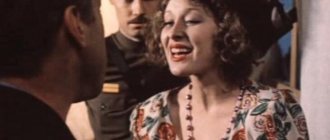They say you can sit on a needle so that you won’t even find a haystack! Today we will discuss a wonderful series in which a modest chemistry teacher finds out that he has cancer and has very little time left to live. But he does not lose heart, and in order to provide his family with a comfortable existence after his death, he embarks on Breaking Bad, or rather begins to cook the drug methamphetamine.
It would seem that what could be interesting here? A banal plot and no intrigue. Boring! But this is only at first glance. So, imagine the city of Albuquerque, the largest city in the state of New Mexico. There you can find tequila, cacti (cacti), illegal immigrants, drug rings (drug cartels) and, of course, severed heads. The state itself is full of sand and rocks, so children never get bored there. And also, there is the town of Roswell, not far from which in 1947, they say, very interesting things were happening, and somewhere here is the Black Mesa research center. This is exactly where the events of our series take place.
Breaking Bad is not just a series about how to properly cook methamphetamine or meth and make a boatload of cash (earn a lot of money), it is much more serious and emotional than it might seem at first glance. The directors and screenwriters raised a pressing topic - what lengths a person is willing to go under penalty of death (under penalty of death) and what moral principles they cross in order to achieve their goal. In the case of the main character, Walter, it turned out that when you have less than a year left to live, your value system simply crumbles to dust.
Walter’s slogan can safely be considered the phrase “ I have nothing to lose ” - “I have nothing to lose.” Indeed, why stop yourself if you have very little time left to live?
For those who haven't seen any of the episodes yet, we suggest you watch the trailer for the series and see if it's worth your time.
Greatest movie of all time
As luck would have it, the creators of the popular TV series Breaking Bad were inspired by The Godfather, a film considered by many to be one of the greatest works in the history of filmmaking. At first glance, these are two completely different stories.
Events take place at different times, completely different scenarios, main characters, surroundings. In addition, the series is imbued with notes of, albeit gloomy, humor, while the Godfather barely smiled throughout the three films. But if you dig deeper, you can see a reference to the classic film directed by Francis Ford Coppola, some elements can be traced throughout the film.
Walt White is a reflection of Michael Corleone
The biggest similarity between Breaking Bad and The Godfather is the similarities between Walter White and Michael Corleone. Although it would be much more logical to compare Walt with Vito, played by Marlon Brando, Michael is still a more suitable comparison. Both characters move from a position of innocence to a position of criminal power and are true intellectuals in a world where muscle rules.
Fans saw Nikita Mikhalkov’s grandson, Alexander, for the first time
Why Pavel Derevianko did not marry the mother of his children, and how he lives now
Astronomers have assessed the danger of a giant asteroid approaching Earth
Both protect their families from their cruel business, but end up putting them in mortal danger. Both hide and then return home to live in the old house.
Quotes from the series Breaking Bad
Walter: “ We tried to poison you.” We tried to poison you because you're an insane, degenerate piece of filth, and you deserve to die. "We tried to poison you. We tried to poison you because you are a madman and a degenerate piece of scum and you deserve to die."
Walter: “ You clearly don't know who you're talking to, so let me clue you in. I am not in danger, Skyler. I am in danger. A guy opens his door and gets shot. And do you think that of me? No! I am the one who knocks! "You obviously don't know who you're talking to, so let me enlighten you. I'm not in danger, Skyler. I am the danger. The guy opens the door and gets shot. And you think this is about me? No! I'm the one who knocks!
Skyler: “All I can do is wait. That's it. That's the only good option. Hold on, bide my time, and wait. " Walt: " For what? "Skyler:" For cancer to come back. " Skyler: "All I can do is wait. That's all. This is the only correct choice. Hold on and wait." Walt: "Wait for what?" Skyler: "When the cancer comes back."
Walter: “ I'm not in the meth business. I'm in the Empire business. ” Walter: “My business is not an amphetamine. My business is an empire."
Read also
Correcting Nastya Ivleeva's English
Dark cinematography
The techniques that camera operators used during the filming of the television series Breaking Bad were largely borrowed from The Godfather. Gordon Willis's take on the 1970s classic is known for creating subtle suspense and innuendo while keeping the main character's facial expressions completely hidden from the audience. Several examples of such an unusual technique are also implemented in the popular series. This works especially well with the image of Walter White.
Reviews
Wake up, Walter, wake up. You are so unhappy that you don’t even have time to think about it: trying in vain to hammer the basics of chemistry into the heads of young people, in your free time from work you wash cars without stopping coughing. Here's a surprise, my friend: you worked hard for the good of your family, but fate, having probably managed to give everything away to more successful Americans, gave you a cancerous tumor as a bonus. As if having a disabled son who is unable to walk without crutches is not enough. As if the wife’s relatives weren’t enough: one brazenly steals things, the other sincerely considers himself a tough guy, pushing you into the background with his fables about catching dangerous criminals. As if this capitalist dogma is not enough: you are not a person without striving for an intended goal. You see, Walter, you're nothing if after 40 years you're still a loser. And this can’t help but infuriate you, right? Can you feel this hatred, buddy? It has been building up in you for years. And you are ready now, in this fateful moment, to amaze yourself first of all. Boss? He would have gone to hell! Death? The hose is for you, just wait, oblique, it’s not evening yet! We will be out of breath, but methodically and profitably, yeah. Ohoho, you have a whole plan, buddy! You intend to knock out the bitch fate, round after round, for every year of humiliating life. This is your main battle: she has trump cards up her sleeve, you have pride in your son, who is not ashamed of his illness, love for a hypocritical wife, loyalty to your beloved science, a wild desire, even if just a little, to be a real fighter, without turning your cheek, but throwing a strong fist forward. And let all this easily lead you into an immoral whirlpool, into the abyss called “manufacture and sale of drugs”, let you lose the trust of your loved ones and friends, let’s not forget that this battle is only yours and the devilish coquettes. And we are just outside observers, we worry about you, because Mr. Walter White is each of us who holds back a million desires within himself, not even knowing whether he will be lucky enough to fulfill them before the last guest star
– Death. Don't let me down, buddy... A true serial explosion was created by Vince Gilligan, the screenwriter of the cult show "The X-Files", who became a creator at the right time - the everyday life of a dying chemistry teacher, saving his family money for his future funeral from the sale of drugs, turned out to be incredibly exciting, which is just right and wonder why this story is being filmed not with the help of titans HBO, but with low-budget AMC (they, moreover, are behind the ratings “Mad Men”). And if the first season of seven episodes came out as a starter, then the next two, taking into account the strong development of the plot, the dazzling cinematography of Michael Slovis, without a hitch of the acting cast, are simply carried away into an unforgettably ordinary Universe, where everything is on the verge of realism and absurdity, where there is no end to the malicious giggling satire and tense drama. Mad Men is impressive, they smoke Lucky Strikes and drink Martinis so colorfully; Breaking Bad, paradoxically, is in some ways a continuation of the retro show, because both in the 1960s and in the 2000s people remained the same: some losers, others inveterately lucky. This is your fucking world: everywhere, no matter the Schopenhauer, an enchanting lottery, someone’s income from business, someone’s got a bullet in the head, and another has lung cancer, don’t let him flutter, everyone will be there, yeah. The series, led by the visionary Gilligan, who loves to speculate, conveys the main idea - in that bygone, but not forgotten world, even though everyone was going crazy, they still played by the rules, now the balance of personal success and public morality has become especially fragile, the Earth is slowly ceasing to find output in half measures, semitones. The world is mired in the complexes of an individual person and a citizen, in most cases choosing, as it seems, the only correct path at that moment, which ultimately leads further and further away from the necessary principles, forcing him to deceive himself at every step and give in to numerous temptations. This is no longer “this is my goal” - this is the disastrous “this is not enough for me, I want more.” And there Death obediently awaits. But what a scoundrel Bryan Cranston is, casting aside any doubts about his controversial hero with his charismatic performance! It’s impossible not to sympathize with his Walter White, despite all the bad things he managed to do during the intriguing three seasons of the glorious show. And how wonderful it is that he is contrasted with young Aaron Paul, whose dropout Jesse Pinkman does not miss the opportunity to get into trouble worse than the previous one. This amusing duet tirelessly draws the viewer along with it: somewhere out there a lie has come loose, white men have become insolent, and this fucking world of yours is spinning and spinning... Where you are a criminal, and a victim, and a slowly dying boxer in a twitchy ring with greedy people laughing outside it observers. I want to live! I want love! I want money! I want many, many friends! I want, I want, I want... Oh, calm down, my friend, what is our entire stay in this world? Just a chain of chemical reactions. Explosion! And there is no you, and there is no precious-damned world. Our desires are not there.
Presence of famous quotes
Breaking Bad borrowed several quotes directly from The Godfather. Both Michael Corleone and Walter White advise listening to Sun Tzu, who suggested “keep your friends close and your enemies closer.”
Taking large amounts of vitamin D without a doctor's prescription harms your kidneys
Kristina Asmus told how one of her working days went
Honey blonde and other fashionable shades for fair-haired people: spring 2021 trends
Saul Goodman turns to Jesse to give him a kind word “for old times’ sake.” This phrase reflects almost the same request from Tessio in The Godfather.
Saul also taunts Skyler with a popular phrase from The Godfather - "an offer you can't refuse."
A series that comes out once in a generation, or why Breaking Bad is so good
Warning: There are spoilers for Better Call Saul and The Sopranos. I don’t detract from any of the merits of the technical part of the series - the work of the writers, actors, directors and cameramen; as a viewer, I liked the series - it’s exciting, there are a lot of unexpected turns and situations. But as a critic, there are many things I don’t like. First of all, these very twists and all sorts of coincidences are exciting, but often far-fetched. Take the same leader of a gang of neo-Nazis, who nobly, “by convention,” gifts Walter ten million dollars (!!!) and leaves him and Skyler alive (despite the fact that they can uncover an underground international drug syndicate). And all the other crime bosses, at the right moment, for some reason bow to White’s talent instead of getting rid of him (as happened with Fring’s partner). In my opinion, the main problem of the series lies precisely in its main feature - the transformation of the teacher into Tony Montana. By my boomer years, I had come to the conclusion that people don't change over time. Well, yes, they, of course, change, you can develop inclinations, you can sublimate your inclinations, but the character, the very essence (or gut) of the personality does not change. The criminal is first and foremost a sociopath (not necessarily in the clinical sense of the word). And this is where I come to The Sopranos. The main character is also a criminal (the boss of a mafia group), but if Tony Soprano was not born that way, he at least became influenced by his environment (his father and all his childhood friends were mafiosi), he even used psychotherapy sessions in order to become more effective boss, applying new knowledge in behavioral psychology. Tony is very self-centered, self-interested, and at times unbalanced, but it was these qualities that helped him reach heights in “our business,” grow up in a different environment, he could become a successful businessman, manager, captain (not a capo), but not an athlete. The entire criminal part of the series can be replaced by the everyday life of a middle manager in some corporation, and leave the family part - and everything will be organic. But Walter White doesn't seem like a sociopath to me. Yes, he is proud and stubborn as a sheep, but I don’t see the inclinations that he showed like Heisenberg in a chemistry teacher working part-time at a car wash. A person with such a psychotype would have taken the criminal path earlier or would have founded/left for another company, and would have finally become the next Unabomber. There is a moment in “The Sopranos” when a young gangster, who is simultaneously trying to master screenwriting, is in a creative and work crisis and asks his more experienced colleague - where is my character arc, to which he replies that there is none, because. that's life. So he served a little in the army, spent a little time in prison, and in the end - an elderly unfinished mafioso (just a capo, not a boss or at least a consigliere). Stories like this don't sell. But the super-successful “Breaking Bad” is about how a completely unteam player becomes the leader of a drug syndicate. And this contrast between the unrealistic essence and the technical implementation of the series further emphasizes the artificiality of the entire structure. Let's make the meth blue, it will be our feature, like a super clean product. Although in reality this does not happen. But the series bent reality and now drugs in the real world are branded as series drugs. This is certainly cool, but it shows that Gilligan is not a fan of chemical sciences and is not an avid drug addict, i.e. Of course, he used the help of consultants, but he is not in the mood for it. But David DeCesare (the real Italian surname of Chase, the author of “The Sopranos”) is from New Jersey, he grew up with the prototypes of his heroes, and his knowledge and love of detail can be seen in all aspects of the series. There are no blunders like when an ordinary taxi driver is accepted into an ethnic criminal group (at least he should have been known since childhood or trusted people have vouched for him - this is a diaspora, not a school club) or, for example, the consigliere of the family turns out to be Irish. What Gilligan's soul lies in is, of course, filming commercials in “Better Call Saul”; it is clear that this was filmed with love, like the intricate screensavers for the same series. It is obvious that he is passionate about this topic. That's why Better Call Saul and The Sopranos are my picks. Saul and Mike are my favorite characters in the original series, and I'm glad the spinoff is all about them. I believe in these characters as much as I don't believe in Walter White and his young Padawan. In their integrity of image they are similar to Tony. There is even a scene from childhood, when the same Saul Goodman was born from Jim. It was at that moment that he had a character arc. And the very transformation from protagonist to antagonist does not happen for a long time, it happens instantly, when you answer yourself or someone else one question, like “Are you a friend of the cartel?” (or when you sit in the hospital with a broken nose and ask a stranger to kill your offender).
Oranges foretell death
Coppola is known to use oranges to warn the viewer of an imminent murder or attempt on life. In the film "Breaking Bad" the director does almost the same thing, only in a slightly different form.
“It suits her very well”: Reshetova shared a photo of her new hairstyle
What do children look like when the mother is Russian and the fathers are of different nationalities: photos of sisters
Nina wrote a letter to her neighbor apologizing for the noise. The pensioner's answer was surprising
When Ted stumbles and falls, you can see a bowl of oranges in the frame. In another episode, Walt's neighbor throws a bag of oranges when he returns to his old house. Such hints are more likely the director’s idea, and not a consequence of the actions of the characters in the series.
Killer scenes
One of the most famous shocking scenes in “The Godfather” is the reprisal of Michael Corleone’s men against rival gangsters, while Michael himself is surrounded by family and friends at the baptism of his nephew.
Walt presented a modern version. He organized a series of murders of people in prison who could help expose him. Meanwhile, Walt is at home, carefree playing with his baby daughter, while the television news covers the murders of which he himself is the organizer.
Hank confronts Walter White
After Hank discovers that Walter White is Heisenberg, the confrontation scene has many parallels with Michael confronting Fredo in The Godfather Part II. The face-grabbing, Hank/Michael's oscillations from anger to betrayal, and the emphasis on "family."
Vince Gilligan claims that this similarity was not intentional, he only noticed it after watching the legendary scene from the TV series Breaking Bad.
Despite the presence of any similar shots or characteristics of the main characters, hints, clear parallels, these stories cannot be called the same. And is it worth looking for similar moments? Isn't it better to just enjoy watching these films in sequence, alone or in pleasant company? After all, this is what they were created for in their time. But one thing is clear: both directors created truly unforgettable stories if they are talked about for so long.
Found a violation? Report content
Interview with Bryan Cranston
Before the release of the final season, Mr. Cranston told Collider what he thought of the series and his character. Let's see what we got here…
- Collider : Bryan, when this show began, could you ever have imagined how dark and twisted this road would get for Walter White? Brian, when you first started filming, could you have predicted how dark and twisted Walter White's path would be?
- Cranston: Well, he gave me that broad stroke of Mr. Chips to Scarface at our first meeting and I thought, “How Scarfacian would that be? Would it be a whitewashed Scarface? Would it be toned down a little bit?” I didn't know. He's such a fine Southern gentleman. When you talk to him, he's engaging and polite and sweet and smart. I just didn't grasp the intensity or the darkness that lurks beneath. Well, at our first meeting, Vince introduced me to the basic idea of turning Mr. Chips into Scarface. I thought, “How much of a Pacino movie can this be?” Is this going to be some kind of light version?” I didn't know the answer. He's such a likable Southern gentleman. When you talk to him, he looks so charming and polite, sweet and smart. I just couldn't imagine the tension or darkness that lay behind it all.
- Collider: How do you feel about viewers who still have a lot of sympathy for your character, even though he has become a monster, in many ways? How do you feel about the fact that audiences still sympathize with your character, despite the fact that he has turned into a real monster in many ways?
- Cranston: This guy is a good guy who's trying to do the right thing. He's got a limited amount of time, so he makes this rash decision. We've all made rash decisions before, but perhaps not how this has manifested. So, you're with him. And then, you're tested. The audience was tested at certain points of the storytelling, over the six years, and there's going to be a turn, but that turn is so subjective. Some people say that turn happened in Season 2. Some people say it happened when they let Jane (Krysten Ritter) die. Some people will say it happened when they let something else happen. Personally, I feel it happened in the very first episode when he attempted to become someone he wasn't. Once you do that, it's a slippery slope. He lost his soul, and he allowed it to just drift away. He's in trouble. Walter is a good guy who tries to do the right thing. He has limited time, so he makes this rash decision. We've all acted recklessly at times, maybe just not in the way Walt had to. So you're on his side. And then they start testing you. Viewers have been tested at certain points multiple times over 6 years, and there's still a twist waiting for you all, but it's so subjective. Some say that changes occurred in the second season. Others will say it happened when Jane (Krysten Ritter) died. Still others will say it happened when something else happened. Personally, I think it all happened in the very first episode when Walt tried to become something he wasn't. This is a slippery slope - once you step on it, you risk everything. He lost his soul and let it simply dissolve. He's in trouble.
- Collider: How careful have you had to be with showing how meth is made? How careful did you have to be when showing the process of making meth?
- Cranston: Whenever we showed it, we never showed it in sequence. We always left a step out or did it out of order. Whenever we showed the cooking process, we never followed the correct sequence of actions, or we skipped some step.
- Collider: Bryan, what was your favorite scene that you acted in and just thought was awesome? Brian, what is your favorite scene you've been in that you think is amazing?
- Cranston: The scene when I watched Jane die resonated with me tremendously, as a father, having that type of moral struggle. He really was struggling with what he should do and what the best move was, and vacillating with the error of omission is what finally took him. The scene in which I watch Jane die shocked me as a father going through a moral struggle. He is truly "torn" between what he should do and what is best for him, and this manifestation of indecisiveness about action eventually overwhelms him.
Read also
Lyrics and translation of the song Katy Perry - Bon Appetit






